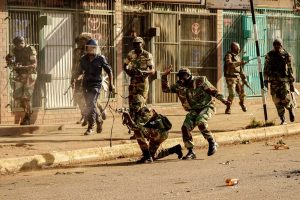The Institute for Security Studies has described as “unsurprising” the testimony by two Zimbabwean army generals who denied that troops killed six people on August 1 when the military was called in to crush protests following the country’s disputed elections.
Source: Zim protesters’ killings: Army generals’ denials ‘not surprising’ | News24

A soldier fires shots towards demonstrators, on August 1 2018, in Harare, as protests erupted over alleged fraud in the country’s election.
Protests in Zimbabwe’s historic elections turned bloody on August 1 as a man was shot dead during demonstrations over alleged vote fraud and the president appealed for calm. The man died after soldiers fired live ammunition during opposition protests in downtown Harare, AFP reporters saw.
/ AFP PHOTO / Zinyange AUNTONY
The generals, according to Associated Press, suggested this week that Zimbabwe’s opposition was responsible for the killings.
Giving oral evidence before the commission, Zimbabwe Defence Forces Commander General Philip Valerio Sibanda said he did not believe the army was responsible for the carnage, said an AFP report.
“I do not believe that any of the soldiers fired. Yes, they fired in the air, but I do not believe any could have aimed shots at the civilians. I have no reason to believe that one of the soldiers could have shot and killed those people,” said Sibanda.
Country’s first elections without Mugabe
In an interview with News24, Senior researcher at ISS, Derek Matyszak said that the denials were not surprising as the army and police wanted to “justify their actions” by blaming the opposition, following the globally condemned killings.
On August 1, armed soldiers were deployed in the capital, Harare, to suppress a protest against delays in announcing results of the country’s first elections without former ruler Robert Mugabe.
Gunfire erupted and six people died. President Emmerson Mnangagwa set up a commission of inquiry, headed by former South African president Kgalema Motlanthe, to probe the killings.
Matyszak said that although commission’s terms of reference were skewed in favour of the military and police, it was highly likely to take a middle ground in its findings.
“Well, the police and military would justify their actions by blaming the opposition. The terms of reference already also say it was necessary for the military to intervene. The brute force, however, is not permissible under the country’s constitution, therefore the commission is likely to partially blame both the MDC (Movement for Democratic Change) party and the military in its findings,” said Matyszak.
A NewsDay report on Wednesday quoted Detective Chief Inspector Edmore Runganga, as telling the commission that the police were now close to arresting MDC’s Nelson Chamisa.
The Harare based detective placed a huge portion of blame on the MDC aligned supporters, as he claimed that they were in possession of small firearms.
“The argument from the police is going to be treated with contempt by the public. It is also likely not going to be taken seriously by the commission. In addition, I think the opposition is not going to accept the outcomes of the commission,” said Matyszak.
COMMENTS